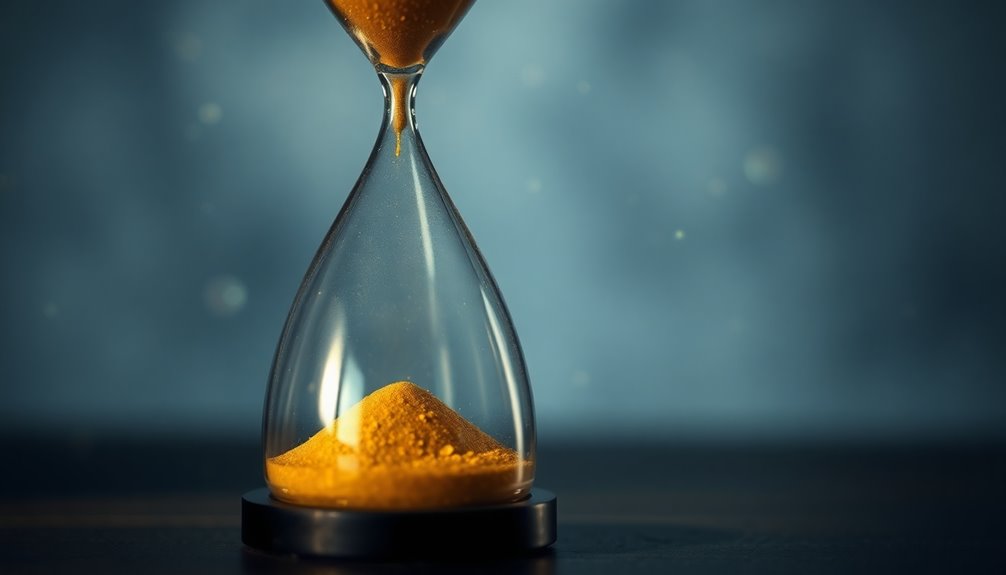
I've always found short-term memory fascinating, especially how it serves as the initial processing stage for the information we encounter daily. It's intriguing to think about how we can only hold about seven items for mere seconds without any effort to retain them. I often wonder what factors truly impact its effectiveness. As I explore the nuances of this cognitive process, I realize there are techniques that can notably enhance our retention. What if I told you that understanding these techniques could transform how you manage information in your everyday life?
Main Points
- Short-term memory temporarily holds and processes information, with a typical capacity of 7 items (±2) for about 15 to 30 seconds.
- It plays a crucial role in bridging sensory input and long-term memory through encoding, storage, and retrieval processes.
- Factors such as attention level, emotional state, and sleep quality significantly influence the effectiveness of short-term memory.
- Techniques like chunking, spaced repetition, and active recall can enhance retention and retrieval in short-term memory.
- Unlike long-term memory, short-term memory is quick but less reliable, primarily using acoustic and visual encoding methods.
Definition of Short-Term Memory

Short-term memory refers to the cognitive system responsible for temporarily holding and processing information. It's essential for tasks like remembering a phone number long enough to dial it or recalling items on a grocery list. This type of memory is limited in capacity, typically holding around seven items, give or take two.
I find it fascinating how this limitation plays a vital role in our daily functioning. The duration of short-term memory is also significantly brief, lasting about 15 to 30 seconds without active rehearsal. This means if I don't repeat the information or actively engage with it, it'll quickly fade away.
The mechanism behind this memory system involves encoding, storage, and retrieval processes, which I'll explore later. Short-term memory serves as a vital bridge between sensory input and long-term memory. It allows for the quick organization and prioritization of information, enabling us to make decisions and respond to our environment effectively. Additionally, understanding the rehabilitation strategies for cognitive disorders can enhance cognitive functions affected by short-term memory impairment.
Understanding this definition helps clarify the role short-term memory plays in our cognitive architecture, emphasizing its importance in both everyday tasks and complex cognitive activities.
How Short-Term Memory Works
Working with information in our short-term memory involves several key processes: encoding, storage, and retrieval. When I encounter new information, my brain first encodes it, transforming sensory input into a form that can be processed. This involves recognizing patterns and associating new data with existing knowledge. For example, when I hear a name, I might connect it to someone I already know, facilitating easier recall.
Once encoded, the information moves into storage, where it remains temporarily. Short-term memory has a limited capacity, often cited as 7 ± 2 items, which means I must actively manage what I hold. I might group or chunk related information to maximize this capacity.
Retrieval is the final step, where I access stored information to use it in decision-making or problem-solving. Often, I find that the effectiveness of retrieval depends on how well I encoded and stored the information initially. Additionally, research indicates strong links between brain function and behavior, which can further inform strategies for enhancing memory processes.
With practice, I can enhance these processes, improving my ability to handle and manipulate information within my short-term memory. Understanding these mechanisms allows me to develop strategies that optimize my cognitive performance in both academic and everyday contexts.
Factors Affecting Short-Term Memory

Several factors can influence how effectively I manage my short-term memory, impacting my ability to encode, store, and retrieve information. One critical factor is the level of attention I devote to the information. If I'm distracted, my capacity to process and remember details diminishes considerably. Additionally, the complexity of the information plays a role; simpler concepts tend to be easier to recall than more intricate ones.
Another important aspect is the emotional state I'm in during the learning process. High stress or anxiety levels can negatively affect memory retention. Sleep also impacts my cognitive functions; insufficient rest can hinder my memory performance. Research indicates that cognitive rehabilitation can support individuals in improving their memory capabilities.
Here's a summary of these factors:
| Factor | Description | Impact on Memory |
|---|---|---|
| Attention | Focus level during information processing | Higher attention enhances recall |
| Complexity | Simplicity of the information | Simpler info is easier to remember |
| Emotional State | Stress or anxiety levels | High stress decreases retention |
| Sleep | Quality and quantity of rest | Sleep deprivation impairs memory |
Understanding these influences helps me better navigate my daily memory challenges.
Techniques to Improve Retention
Memory retention can be considerably enhanced through the application of effective techniques. One approach I find particularly useful is chunking, which involves breaking information into smaller, manageable units. For instance, when trying to remember a long string of numbers, I group them into sets, making it easier to recall.
Another technique I employ is the method of loci, often known as the memory palace. By visualizing a familiar place and associating items I need to remember with specific locations within that space, I create strong mental cues that aid recall.
Additionally, spaced repetition is a strategy I've integrated into my learning. Instead of cramming, I review information at increasing intervals. This technique not only reinforces memory but also combats the forgetting curve.
Finally, I utilize active recall by testing myself on the material. Rather than passively reviewing notes, I actively engage with the content, prompting my brain to retrieve information. This practice not only highlights what I've mastered but also reveals gaps in my knowledge that need addressing. Cognitive psychology research has shown that these techniques can greatly mitigate cognitive dissonance, helping learners better integrate new information with existing knowledge.
Short-Term Memory vs. Long-Term Memory

The distinction between short-term memory and long-term memory plays an important role in understanding how we process and retain information. As I explore these two types of memory, I find their differences striking and vital for various cognitive tasks.
Short-term memory, often referred to as working memory, holds information temporarily, usually for about 15 to 30 seconds. In contrast, long-term memory stores information more permanently, potentially for a lifetime.
Here are some key differences I've identified:
- Duration: Short-term memory lasts seconds; long-term memory can last years.
- Capacity: Short-term memory typically holds 5-9 items; long-term memory has virtually unlimited storage.
- Encoding: Short-term memory encodes information acoustically or visually; long-term memory often utilizes semantic encoding.
- Retrieval: Short-term retrieval is quicker but less reliable; long-term retrieval can take longer but is usually more accurate.
- Functionality: Short-term memory is essential for immediate tasks; long-term memory supports knowledge accumulation and life experiences.
Understanding these differences enhances my ability to apply memory techniques effectively, ensuring I can optimize my learning and retention strategies.
Frequently Asked Questions
How Does Age Affect Short-Term Memory Capacity?
As I've observed, age affects cognitive capacity much like a sponge losing its ability to absorb water. Older adults often struggle with retaining information, indicating a decline in processing speed and memory retention efficiency over time.
Can Stress Impact Short-Term Memory Performance?
I've observed that stress considerably impacts cognitive performance. When under stress, I find my focus diminishes, leading to decreased retention of information. This suggests that managing stress is essential for ideal cognitive functioning and memory tasks.
Is Short-Term Memory Loss a Sign of a Medical Condition?
Think of short-term memory loss as a flickering bulb—it might signal an underlying medical condition. I've noticed that persistent memory issues can indicate anxiety, depression, or neurological disorders, warranting a thorough evaluation by a healthcare professional.
What Role Does Sleep Play in Short-Term Memory?
I've found that sleep considerably enhances cognitive functions. During sleep, our brains consolidate information, helping us retain what we've learned and improving our ability to recall details. Quality sleep is essential for ideal cognitive performance.
Are There Specific Foods That Enhance Short-Term Memory?
I've noticed that incorporating blueberries and fatty fish into my diet seems to sharpen my focus. These foods contain antioxidants and omega-3s, which enhance cognitive function and support brain health, making memory retention more effective.
Read The Next Blog Post –
In understanding short-term memory, I realize it's not just a fleeting storage space; it's a critical component of our cognitive landscape. As I ponder the factors that influence its performance and the techniques to enhance it, I can't help but wonder: what if we could access its full potential? The implications for our decision-making and problem-solving abilities could be profound. After all, every fleeting thought could hold the key to a breakthrough, if only we could remember it.




